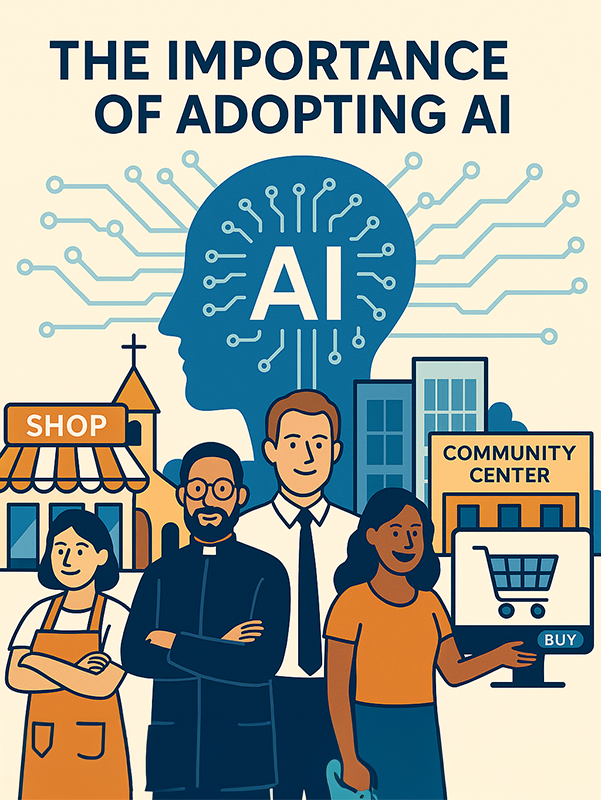
Why Every Organization — From Small Business to Church — Needs to Adopt AI Now
Introduction
Artificial Intelligence (AI) is no longer the future — it’s the present. What was once the domain of tech giants and sci-fi movies has now become an everyday tool for businesses, churches, non-profits, community-based organizations, and even small family-run shops.
From streamlining operations to connecting with audiences in more personal ways, AI is helping organizations thrive in a fast-paced, digitally driven world. Whether you’re running a corporation, leading a congregation, or selling handmade goods online, ignoring AI today is like ignoring the internet in the late ’90s — you’ll risk falling behind while competitors surge ahead.
1. Small & Corporate Businesses — The Competitive Edge
For both small businesses and large corporations, AI is a force multiplier.
-
Data-Driven Decisions: AI tools can analyze customer trends, predict market shifts, and recommend strategies in minutes — something that used to take weeks of manual research.
-
Automation: Customer service chatbots, email automation, and AI-powered scheduling tools reduce repetitive work so teams can focus on high-value activities.
-
Cost Efficiency: AI streamlines processes, reduces errors, and optimizes inventory and supply chains, ultimately saving money.
Example: A local HVAC company uses AI scheduling software to assign technicians based on skill, availability, and proximity — increasing customer satisfaction and reducing fuel costs.
2. Churches — Extending Ministry Beyond the Pews
Churches can use AI to support their mission without replacing the human connection that’s core to their work.
-
Sermon Preparation & Study Tools: AI can help pastors organize research, generate sermon outlines, and translate messages for multi-language congregations.
-
Community Engagement: AI chatbots can answer questions about service times, events, or beliefs at any hour.
-
Personalized Communication: AI can send tailored devotionals or encouragement messages to different members based on their needs or interests.
Example: A medium-sized church uses AI-powered transcription to instantly convert sermons into blog posts, podcasts, and social media content, reaching members who couldn’t attend in person.
3. Non-Profits & Community Organizations — Doing More With Less
Non-profits often operate with tight budgets and limited staff, making AI an incredible asset.
-
Fundraising Optimization: AI can identify which donors are most likely to give and suggest the best time and method to reach them.
-
Grant Writing Support: Tools like AI writing assistants can draft and refine grant proposals faster, freeing up staff to focus on programs.
-
Impact Tracking: AI can collect and analyze data from community programs, helping organizations report outcomes more effectively to donors and stakeholders.
Example: A food bank uses AI inventory tracking to predict demand during certain seasons, ensuring food is always available where it’s needed most.
4. Mom & Pop Shops — Staying Competitive in a Digital World
Small family-run stores face growing competition from online giants — but AI can level the playing field.
-
Local SEO & Marketing: AI can create effective online ads, suggest keywords, and manage social media, helping small shops appear in local searches.
-
Customer Loyalty Programs: AI can analyze purchasing patterns to offer personalized discounts or recommendations.
-
Inventory Suggestions: AI can forecast which products are likely to sell best during certain months, preventing overstock or shortages.
Example: A neighborhood coffee shop uses AI to predict which pastries will sell best each day, reducing waste and boosting profits.
5. E-Commerce Shops — Scaling Without Limits
For online sellers, AI is practically a must-have to remain competitive.
-
Product Descriptions & SEO: AI can create optimized product titles and descriptions in seconds.
-
Dynamic Pricing: AI adjusts prices based on demand, competition, and seasonality to maximize profits.
-
Customer Insights: AI analyzes shopper behavior to suggest upsells, cross-sells, and targeted email campaigns.
Example: An Etsy seller uses AI to generate professional product mockups and social media ads, cutting design time in half while doubling listing views.
Conclusion — The Time to Adopt AI is Now
AI isn’t just about keeping up with technology — it’s about staying relevant, improving efficiency, and deepening relationships with the people you serve.
From boardrooms to church pews, and from bustling online stores to quiet corner cafés, AI offers tools that adapt to your unique mission and goals.
The organizations that embrace AI now will be the ones leading their industries — and communities — tomorrow.



